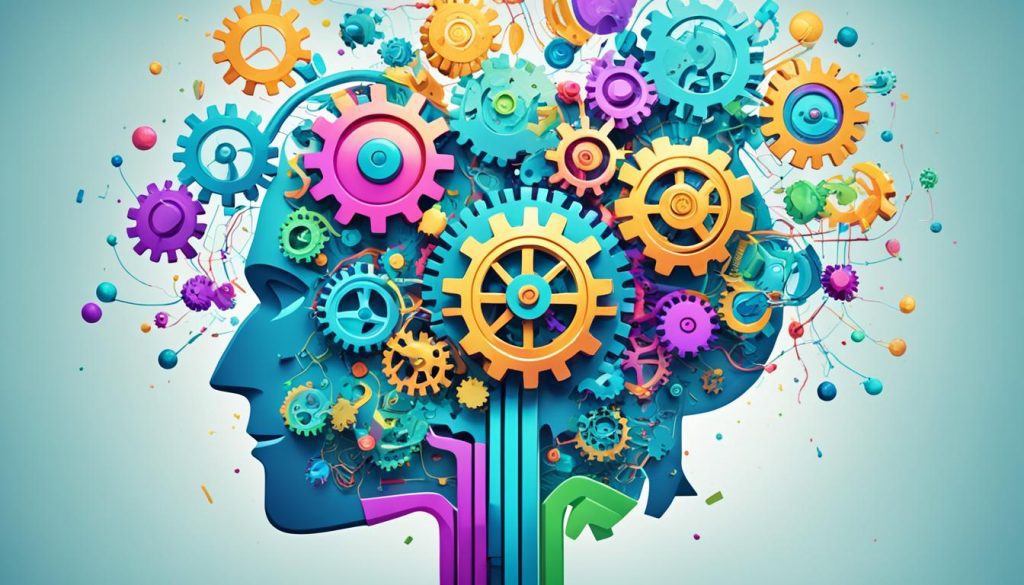Did you know that 1 in 5 people will face a diagnosable mental disorder this year? This fact shows how important it is to have good mental health resources and strategies. I want to share ways to improve our mental health and be strong against life’s ups and downs.
Mental wellness is more than just staying healthy. It’s about feeling happy and being able to handle stress. By focusing on our emotions and managing stress, we can live better lives.
Taking care of ourselves is key to good mental health. It’s important for everyone, not just those with mental health issues. There are many simple and structured ways to help our mental well-being.
In this guide, I’ll talk about easy ways to get better mental wellness. We’ll look at how making strong friendships, staying active, and being mindful can help our mental health. Let’s start this journey to better mental health together.
Understanding Mental Health: More Than Absence of Illness
Mental health awareness is more than just knowing when someone is sick. It’s about our emotional, psychological, and cognitive health. It means feeling good, handling stress, and having strong relationships.
Defining Mental Well-being
Mental well-being is not just the opposite of mental illness. It’s about living a good life, dealing with problems, and being strong. Studies show that about 25% of people face big impacts on their thoughts and actions. This can lead to anxiety or depression.
Components of Strong Mental Health
Strong mental health has several important parts:
- A sense of purpose
- Ability to adapt to change
- Balance between work and personal life
- Positive self-esteem
The Importance of Emotional Resilience
Being emotionally resilient is key for good mental health. It means you can get back on your feet after hard times and stay positive. This helps you handle life’s ups and downs better.
| Aspect | Impact on Mental Health |
|---|---|
| Positive Work Environment | Significant influence on employee mental state |
| Community-Based Care | Better recovery outcomes than institutional care |
| School-Based Programs | Effective for promoting child and adolescent mental health |
The Role of Self-Care in Mental Wellness
Self-care is key to keeping our minds healthy. It boosts our self-esteem and lowers anxiety. Yet, many of us put self-care last because we’re too busy.
Doing things we love is essential for our emotional health. When I’m down, I focus on positive actions to bounce back. This method works well, as studies show it cuts stress and makes us happier.
To improve my mental health, I follow these steps:
- Make quality self-care a priority
- Challenge negative thoughts
- Practice self-compassion
- Set boundaries when needed
- Connect with joyful activities
Exercise is a big part of my stress relief. It helps my brain handle stress better and boosts my immune system. I try to get 7-8 hours of sleep each night, as it’s key for staying mentally well.
| Self-Care Activity | Benefit |
|---|---|
| Regular Exercise | Reduces anxiety and depression |
| Mindfulness Meditation | Manages stress and improves focus |
| Healthy Diet | Stabilizes mood and energy |
| Social Connections | Decreases feelings of loneliness |
By adding these self-care habits to my daily routine, I’ve seen big improvements in my mental health and emotional well-being.
Building Emotional Intelligence for Better Mental Health
Emotional intelligence is crucial for our mental health. It means knowing and handling our feelings, understanding others, and getting better at social skills. Let’s see how we can improve our emotional smarts for better mental health.
Recognizing and Managing Emotions
Being aware of my feelings is the first step to handling them. When I feel stressed or anxious, I take a moment to figure out what I’m feeling. This helps me react better in tough situations.

Developing Empathy and Social Skills
Empathy is key for strong relationships. I try to see things from others’ viewpoints to understand them better. This has made my social skills better and helped me connect more deeply with people.
Practicing Self-Awareness
Self-awareness is the base of emotional intelligence. I often think about my thoughts, feelings, and actions. This has led to smarter choices and better mental health.
| Emotional Intelligence Skill | Benefits |
|---|---|
| Self-awareness | Better decision-making, improved mental clarity |
| Managing emotions | Reduced stress, improved mood |
| Empathy | Stronger relationships, better communication |
| Social skills | Career advancement, leadership abilities |
Building emotional intelligence takes time, but it’s worth it. By working on these skills, I’ve seen big improvements in my mental health and life quality.
Stress Management Techniques for Mental Health
Stress management is key for good mental health. In the UK, mental health issues cause up to 40% of sick leaves, costing about £13.5 million. With 20.1% of workers putting in over 45 hours a week, stress is no surprise.
Effective stress relief begins with spotting stressors. These can be things outside us or our own thoughts and actions. Once we know what they are, we can use strategies to deal with them.
Relaxation techniques help with anxiety. Deep breathing, progressive muscle relaxation, and mindfulness can lower stress. Regular exercise also helps by releasing endorphins and distracting us from our worries.
Managing time well is also important for stress. It means setting priorities, knowing what’s really important, and not overloading ourselves. This helps keep us balanced and less stressed.
| Unhealthy Coping Mechanisms | Healthy Coping Strategies |
|---|---|
| Alcohol or drug use | Regular exercise |
| Binge eating | Balanced nutrition |
| Excessive screen time | Mindfulness practices |
| Social withdrawal | Maintaining social connections |
| Procrastination | Effective time management |
There’s no single way to manage stress that works for everyone. Try different techniques to see what suits you best. If stress gets too much, don’t hesitate to get professional help. Your mental health is important.
The Power of Social Connections in Mental Well-being
Social connections are key to our mental health. They can make us feel better and even help us live longer. Let’s see how we can make these connections stronger for our mental health.
Nurturing Relationships for Emotional Support
Having strong social ties is vital for emotional support. Studies show that people with a big support network have less anxiety and depression. Not having friends can be worse than being obese or smoking.

Benefits of Face-to-Face Interactions
Meeting people face-to-face is great for our mental health. These meetings release oxytocin, also known as the “bonding hormone.” Just a five-minute chat can make us feel better and build stronger relationships.
Building and Maintaining a Support Network
Creating a strong support network is hard work but pays off. Here are some tips to help you:
- Reach out to friends and family often
- Join groups or clubs you like
- Volunteer in your area
- Be open to making new friends
| Social Connection Factor | Impact on Health |
|---|---|
| Strong social connections | 50% increased chance of longevity |
| Low social interaction | Similar to smoking 15 cigarettes a day |
| High social support | Lowest odds of mortality from cardiovascular disease |
Remember, investing in social connections is good for your mental health. By working on relationships, meeting people in person, and building a support network, we can greatly improve our mental well-being.
Physical Activity and Its Impact on Mental Health

Regular physical activity greatly benefits our mental health. Exercise releases endorphins, which boost our mood and cut down stress. Even a bit of activity can improve our overall well-being.
Studies show that adults who are active feel less stressed and tired. A 100-day challenge of walking 10,000 steps a day showed big improvements in mental health.
Here are some ways to add exercise to your life:
- Take a brisk walk
- Dance to your favorite music
- Go for a swim
- Try a new sport
- Follow exercise videos at home
The government says adults should do 150 minutes of moderate activity or 75 minutes of hard activity each week. Start small and slowly increase your activity. This helps avoid burnout and keeps you going long-term.
Physical activity helps with many mental health issues. For instance, yoga is good for people with schizophrenia and helps them recognize emotions better.
| Activity | Mental Health Benefits |
|---|---|
| Yoga | Reduces anxiety, improves mood |
| Walking | Boosts self-esteem, reduces stress |
| Strength training | Enhances cognitive function, reduces depression symptoms |
| Swimming | Improves sleep quality, reduces tension |
Exercise isn’t just for losing weight. It’s about doing fun activities that make you feel good and help with stress. Adding regular physical activity to your routine brings many mental health benefits.
Nutrition and Mental Health: The Mind-Body Connection
What we eat greatly affects how we feel mentally. Nutrition and mental health are closely linked. They impact our mood and brain function. Let’s look at how food affects our minds and emotions.
Foods That Boost Mood and Cognitive Function
Certain foods can boost our brain power. Omega-3 fatty acids in fish, walnuts, and flaxseeds may fight depression. B vitamins in whole grains and beans can make us feel better.
Iron-rich foods like meat and eggs support our brain work. Vitamin D from salmon and mushrooms helps control our feelings.
The Role of Hydration in Mental Clarity
Water is vital for our brain health. Our brains are about 75% water. So, staying hydrated is crucial for clear thinking.
If we don’t drink enough, our thoughts can get fuzzy. Even serious cognitive problems can happen. I drink water all day to keep my mind sharp.
Balanced Diet for Emotional Stability
A balanced diet helps with emotional well-being. Eating too much processed food and sugar can hurt our mental health. On the other hand, diets like the Mediterranean and Japanese, full of fruits, vegetables, and fish, are linked to less depression. I eat a variety of nutritious foods to keep my mood stable.
| Diet Type | Impact on Mental Health | Key Components |
|---|---|---|
| Western Diet | Higher rates of depression | Processed foods, saturated fats, refined sugars |
| Mediterranean Diet | Lower rates of depression | Fruits, vegetables, whole grains, fish, olive oil |
| Japanese Diet | Lower rates of depression | Fish, seaweed, fermented foods, green tea |
By focusing on nutrition, we can support our mental health and brain function. Eating a balanced diet, staying hydrated, and eating mindfully are key. These habits help us stay emotionally stable and healthy overall.
Sleep Hygiene and Its Effect on Mental Well-being
Good sleep hygiene is vital for mental health. A steady sleep schedule helps improve overall well-being. Over 300 million people worldwide deal with depression, and 75% of them have trouble sleeping. This shows how closely sleep and mental health are linked.
Starting a calming bedtime routine can make sleep better. This could be reading, taking a warm bath, or doing some gentle stretches. These habits have made me feel better and think more clearly.
Creating a sleep-friendly environment is also key. A cool, dark, quiet room helps with sleep. Using blackout curtains and a white noise machine has helped me sleep faster and stay asleep longer.
It takes four nights to catch up from just one lost hour of sleep. Adults need seven to nine hours of good sleep each night for their brains to work right. Focusing on better sleep has made me feel more emotionally stable and think more clearly during the day.
| Sleep Hygiene Tips | Benefits |
|---|---|
| Consistent sleep schedule | Regulates body’s internal clock |
| Relaxing bedtime routine | Reduces stress and anxiety |
| Optimized sleep environment | Promotes deeper, uninterrupted sleep |
| Limiting screen time before bed | Improves melatonin production |
| Avoiding caffeine and heavy meals | Prevents sleep disturbances |
By following these sleep hygiene tips, I’ve seen a big boost in my mental health. It’s clear that good sleep is key for both our physical and mental health.
Mindfulness and Meditation Practices for Mental Health
Mindfulness and meditation are key for better mental health. They’ve changed my life for the better. These techniques are great for reducing stress and improving overall well-being.
Benefits of Mindfulness for Stress Reduction
Mindfulness has really helped me handle stress. Studies show it’s good for fighting depression, anxiety, and addiction. It also helps with physical issues like high blood pressure and chronic pain.
Through mindfulness, I’ve learned to spot stress and anxiety early. This has made a big difference in my life.
Different Meditation Techniques for Beginners
For beginners, there are many meditation methods to try:
- Guided meditations
- Mindful breathing
- Body scan meditation
- Loving-kindness meditation
These techniques boost awareness and memory. I began with guided meditations and found them very useful.
Incorporating Mindfulness into Daily Life
You don’t need a lot of time for mindfulness. I’ve added it to my daily life in simple ways:
- Mindful eating
- Mindful walking
- Mindful listening
These small actions have made a big difference in my mental health. Remember, you don’t have to be religious to practice mindfulness. It’s for everyone and can be learned through classes, coaching, or online.
Seeking Professional Help: Therapy and Counseling Options
Getting professional help is a key step in managing mental health. Therapy and counseling provide important tools for those facing tough times. In the U.S., you can find many options like cognitive-behavioral therapy, psychodynamic therapy, and group therapy.
Professional help can really change things. According to Mental Health America, 19% of U.S. adults had mental health issues in 2019. If you’re finding it hard, know you’re not alone. The National Suicide Prevention Lifeline (1-800-273-8255) offers immediate help. For texting, Crisis Text Line is there by texting “MHA” to 741-741.
It’s important to find the right mental health care provider. The Medicare Physician Compare tool can help you find therapists who accept Medicare. Professional groups like the American Counseling Association also offer treatment referrals. Remember, asking for therapy or counseling shows strength, not weakness. It’s a step towards better mental health and well-being.
FAQ
What is mental health?
Mental health is about feeling good, thinking clearly, and acting well. It’s how we handle life’s ups and downs. It’s key for feeling good and living well, not just being free from mental illness.
What are the components of strong mental health?
Having a purpose, adapting to change, balancing work and fun, and bouncing back from tough times are key. These help keep your mental health strong.
Why is self-care important for mental health?
Self-care is vital for staying mentally well. It means doing things that make you feel good, reduce stress, and boost your mood.
How does emotional intelligence relate to mental health?
Emotional intelligence is key for good mental health. It means knowing and managing your feelings, understanding others, and improving how you connect with people. Being aware of your emotions helps you handle them better.
What are some effective stress management techniques?
Good ways to manage stress include deep breathing, relaxing your muscles, and being mindful. Also, planning your time, staying active, keeping friends, and asking for help when needed help a lot.
Why are social connections important for mental well-being?
Having strong social ties is crucial for your mental health. They protect your health and can make you live longer. Being with people face-to-face is best, as it lowers stress and offers support. Building and keeping a support network is important.
How does physical activity benefit mental health?
Being active is great for your mind. It releases happy chemicals that lift your mood and cut stress. Even simple activities like walking or dancing can make a big difference.
What is the connection between nutrition and mental health?
What you eat affects your mental health. Some foods can make you feel happier and think clearer. Drinking enough water is also key for clear thinking. Eating a balanced diet helps keep your emotions stable.
Why is good sleep hygiene important for mental well-being?
Good sleep habits are important for feeling good mentally. Having a regular sleep schedule and a calm bedtime routine helps you sleep better. Getting enough sleep is crucial for handling emotions and thinking clearly.
How can mindfulness and meditation practices benefit mental health?
Mindfulness and meditation are great for your mind. They reduce stress and help you manage your feelings better. There are many ways to try, like focusing on your breath or meditating on kindness. Adding these to your day can make you feel better overall.
When should I seek professional help for mental health?
If you’re struggling with your mental health, get help. There are many types of therapy and counseling out there. Experts can create a plan just for you and help you feel better.








